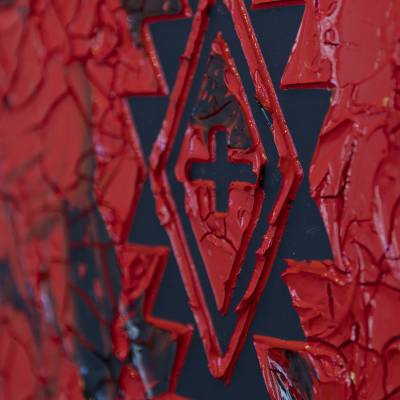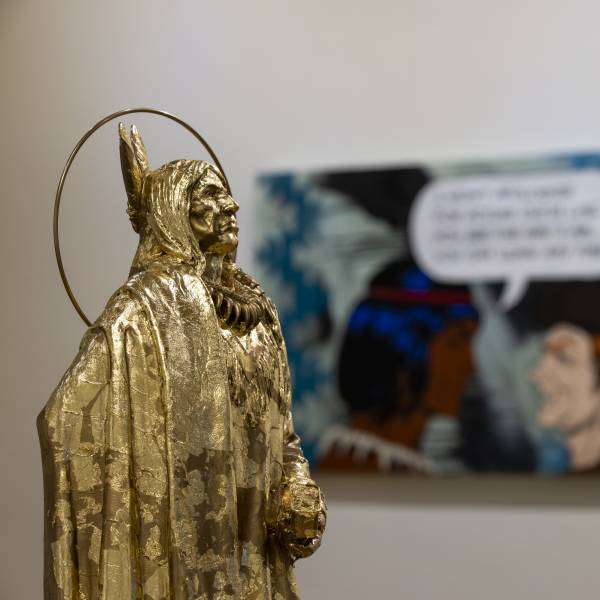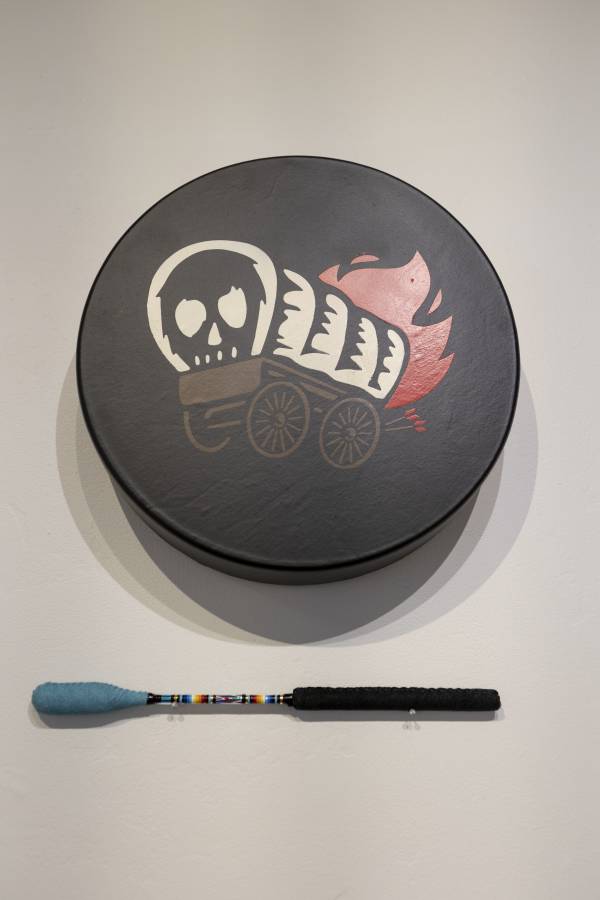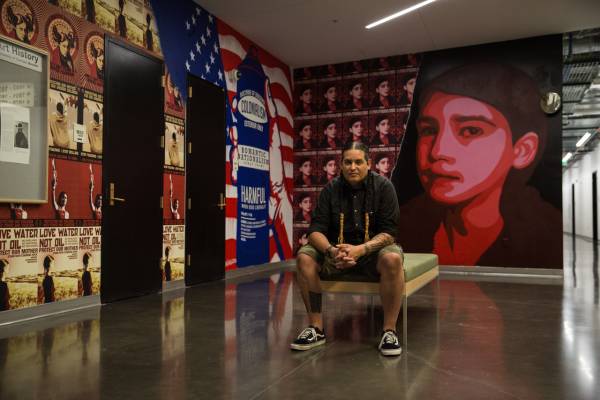The Punk Pan-Indian Romantic Comedy
Friday, Apr 1, 6pm | Old Masonic Hall | FREE

Friday, Apr 1, 6pm | Old Masonic Hall | FREE

On November 20, 1969, over 70 Indigenous Americans sailed from Sausalito, California to the then-abandoned Alcatraz Island in an act of reclamation. The group, which called itself “Indians of All Tribes,” occupied Alcatraz for the next nineteenth months and grew to nearly 400 people before being forcibly removed by police. Despite its significance, the Alcatraz takeover and other political events remain largely absent from the dominant historical narrative.
Art makes history more apparent, and contemporary art has the ability to depict the present relevance of historical legacies. Roots Radical features work by Colorado artist Gregg Deal that reckons with some of the complexity of contemporary Indigenous identity and depicts intersections between the Punk movement and Indigenous rights. Deal combines visual vocabulary from the Pyramid Lake Paiute tribe, of which he is a member, and Punk, whose music and politics have appealed to him since he was a teenager growing up in Park City, Utah, in a materially diverse body of work. He employs the unapologetic, parodic, and anti-hierarchical aesthetics of Punk as well as lyrics from bands such as Minor Threat, Black Flag, and Rancid (whose song informs the exhibition’s title). In doing so, Deal creates a refrain throughout the exhibition and conveys the need for both solace and solidarity in a world that continues to disenfranchise Indigenous people culturally, economically, and politically.

The Punk movement was also a response to disenfranchisement. Histories of it focus on the youth subculture that developed in the United Kingdom during the 1970s, but this focus whitewashes Indigenous influences on Punk, such as longstanding traditions of activism in response to years of genocidal and assimilationist government policy in the United States. Whether the vibrant Indigenous Punk music scene that emerged in Flagstaff, Arizona in the 1980s or the direct actions of the Red Power movement that began in the 1960s, Indigenous struggles for tribal autonomy and self-determination have enriched and redefined Punk time and again, just as they have countered romantic, violent, or erasing perceptions of Indigenous people.
In addition to Punk, Deal incorporates aspects of pop and conceptual art and abstract expressionism to critique settler colonialism’s contradictory stance toward Indigenous existence, a stance that at once denies tribes clean water and appropriates Indigenous culture for use in home décor, sports teams, and wellness brands. Several artworks in the exhibition reappropriate historical artifacts and stereotypical depictions of Indigeneity, using multiple materials and cultural references to alter their appearance and displace them from their original context. Still other works present forms associated with Pyramid Lake Paiute basket weaving as thick, expressive paintings, challenging the Euro-American art historical canon’s claim to abstraction. In both cases, Deal deconstructs the ways in which mainstream culture frames Indigeneity as existing solely in the past despite the persistence of Indigenous ideologies, knowledge, activism, and art in the twenty-first century.

Gregg Deal (Pyramid Lake Paiute Tribe) is a provocative contemporary artist who challenges Western perceptions of Indigenous people, touching on issues of race, history and stereotypes. Through his work—graphic design, paintings, murals work, performance art, filmmaking and spoken word—Deal critically examines issues and tells stories of decolonization and appropriation that affect Indian country. Deal’s activism exists in his art, as well as his participation in political movements. He has been heavily involved with the media activist movement #changethename, posting a video to Vimeo inviting Indigenous people’s commentary on the sports mascots issue in response to mainstream media’s attempted erasure of Indigenous voices. After living in the Washington, D.C. area for 17 years, Deal and his family moved to Colorado, coinciding with his artist residency at the Denver Art Museum. He has performed and exhibited at the Smithsonian, Denver Art Museum, University of Colorado Boulder, Black Cube, Redline Contemporary Art Center, and Woolly Mammoth Theatre Company, among others.